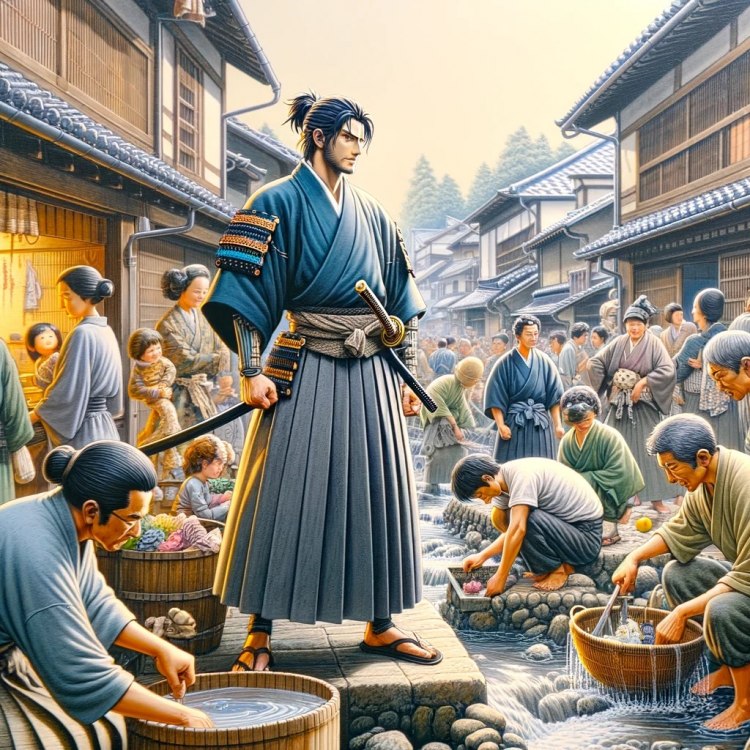The Knightly Waste-paper Man (Fairy Tale)
"Shindo's Redemption" is a poignant tale of honor, resilience, and redemption set in feudal Japan. This narrative follows Shindo, a noble yet impoverished Samurai, and his wife, Tsuiu, as they navigate the challenges of dishonor and displacement...
 Mary F. Nixon-Roulet
Mary F. Nixon-Roulet 
This image was created with the assistance of DALL·E and Canva.com
I
There was once a young noble who was very poor. He was a Samurai who had offended his lord and so was obliged to leave his own province and travel in search of employment. It was very hard for him to find anything to do, for neither he nor his fair young wife had been taught to work.
“Alas! my bride! White as the lily art thou and tender as the carnation,--to what has thy love for me brought thee!” he cried.
But Tsuiu caressed him sweetly and said, “I am happy since my lord has taken me with him. The good-luck god will surely hear our prayers and we shall find a fortunate issue.”
Then was the soul of Shindo lightened and he strode along the highway gladly, and Tsuiu walked beside him, and the breath of the morning was sweet and kind. They walked for many hours and found no rest; but the music of the grass-larks was sweet and the sun was bright.
But when the shadows began to fall, and the fireflies to flit among the tall grasses, and the moon to creep slowly above the crest of the mountains, the little wife drew closer to Shindo San; for in her terror she saw robbers in every tree and bush.
“Be not afraid, my beloved,” he said, as he drew her within his sheltering arms. “See! here is a pleasant knoll beneath this sendai tree. Wrap yourself in my mantle. Pillow your head upon my arm. Then may the god of dreams send you a good-luck dream and may your slumber be sweet. I will watch!”
“I will obey, my lord,” said Tsuiu. She closed her eyes, and, holding the left sleeve of her kimono across her face, she was soon fast asleep.
Shindo watched and waited, his hand upon his sword; but he too was weary, and soon his eyes closed and his head drooped. He slept and dreamed that two huge dragons came out of the West and sought to devour them; and lo! as he cried aloud in terror for the safety of Tsuiu San, a greater Dragon came out of the East and devoured the first two, and he and his bride escaped.
Then he awoke suddenly and sprang to his feet, putting O Tsuiu San behind him, for robbers were upon him, and there were two. He drew his sword and fought fiercely, but they well-nigh overpowered him. He felt his strength fail. The blood was gushing from a wound in his arm. Suddenly there appeared upon the scene a ronin who quickly put to flight the robbers and saved the life of Shindo.
Then he and O Tsuiu San thanked the ronin very heartily, and finding the morning dawn at hand, and hearing the morning bell from a distant temple, they started on their way.
“Tell me first, whence you come and whither you go,” said the ronin. “For I well see that you are of better times, and that misfortune has brought you here.”
“We are in dire distress,” said the Samurai, “and I have scarce a _yen_[1] to buy rice for the breakfast of my wife.” Then he told all their story to the ronin, who, being of a good heart, was grieved at their sorrows.
“It is little that I can do for you myself,” he said, “since I am but a wanderer with nothing in my sleeves. But come with me and I will set you in the way of making a good but simple friend. Yonder are the towers and temples of Yedo,” and he pointed to the roofs of a city gleaming gold in the morning sun. “In a certain street lives a tradesman, a poor fellow, yet of a good heart. He bears the name of Chohachi. Seek him and tell him I commend you to his kindness. My road lies elsewhere. _Sayonara!_” [2]
Bidding good-by to the ronin, the two hurried on and finding Chohachi, he took them in and made them welcome. There they remained several days until O Tsuiu San recovered from her fatigue, and Shindo from his wound. Then Chohachi spoke.
“Honored One,” he said, “very welcome are you and yours to the shelter of our roof tree, but the rice pot holds not enough for four. Is there any way in which you are able to make the pot boil?”
“Good friend,” replied Shindo, “in the house of my fathers the rice pot ever boiled without assistance from me. I know no way.”
Chohachi knit his brows.
“Can the Honorable One teach the young men to fence?”
“Alas,” cried Shindo. “I have little skill as a swordsman. I fear I know not enough to teach fencing.”
“Can the Honorable One teach writing?” demanded Chohachi.
“Of that I know even less,” replied his guest, so mournfully that Chohachi hastened to reassure him. “Some way shall be found to boil the pot even if we have to hunt the magic paddle of the Oni.”
So the tradesman thought and thought.
“What can this dear fellow do?” he asked himself.
“It must be something of the easiest for he seems not to have much thought for trading. I have it! He shall be a waste-paper man! A boy or a simpleton could do that!”
So he purchased a light pole of bamboo with two baskets at the end, and a pair of bamboo sticks. He called the Samurai “Chobei,” for Shindo was too fine a name for a waste-paper man, and the Samurai was started in business.
The first day Chobei lost himself, and had to pay a man to guide him home. He had bought no waste paper and Chohachi laughed at him, and scolded, too, saying,
“Call out! No one will know what you want if you walk about the streets in silence like a monk!”
Chobei was anxious to do all things right, for it pained him to be depending upon the good trader, and it hurt him still more to think of little O Tsuiu San sitting all day over her embroidery, trying to earn a few coins with which to boil the pot.
So, in order to grow used to the sound of his own voice, he went to an open lot, where there was not a house in sight, and shouted, “Waste paper! waste paper!” all day until he was hoarse. The street boys thought he was mad, and they laughed at him and threw stones. Then he went home more discouraged than ever, and Chohachi, choked with laughter, explained again patiently,
“See, good Samurai, go into the back streets; rich people do not sell waste papers. Talk with the women, engage them with pleasant words and flattery, and then say, ‘Perhaps you have some waste paper to sell.’”
So Chobei went forth to try again, and this time he sought in the poorer streets. There young women were washing upon the steps, children were playing upon the pavement, old women were talking in the doorways, and to them all Chobei smiled and bowed, “May the sun goddess smile upon you, honorable august Madame,” he would say with his most courtly air. “That you and your honorable family are in good health is my wish. It gives me pleasure to meet you. I am from a far street and I ask the honor of your acquaintance. Have you any waste paper to sell?”
Although the good women understood, he might have left unsaid all his remarks except the last. But they were pleased with his air, and they ransacked their houses for waste paper. They called him the “Knightly Waste-paper Man,” and soon he had a very good trade and earned many yen, which Chohachi helped him carefully to spend. Then O Tsuiu San and the little daughter whom the gods sent to them, were well cared for.

This image was created with the assistance of DALL·E and Canva.com
II
One day the Knightly Waste-paper Man was crying his wares through the streets when he saw a crowd about a man who had fallen by the way.
“’Tis but a starving beggar,” said one. But Chobei had learned much in the days when he had walked the streets without a _sen_[3] in his sleeves, and his heart was tender. He hurried to the beggar’s aid and to his surprise found that he was no other than Bun-yemon, the ronin who had helped him to escape from his home, when his lord was angry so long ago. He caused him to be taken up and carried home.
That night Chobei talked long with Tsuiu.
“Gratitude is a sacred duty,” he said. “But for this ronin perhaps we should have been murdered, and now that he has reached this low estate, it is our place to help him, but how?” O Tsuiu San sighed.
“In all these years, my lord,” she said, “we have lived by the favor of the gods, but we have saved nothing. How much should we give Bun-yemon?”
“Not less than twenty-five gold _rio_,[4]” said Chobei. “It is a fortune! There is but one way in which we might obtain it. We might sell Iroka.”
“Sell my daughter!” cried Tsuiu. “My lord, my lord!” and she wept bitterly. Chobei wept also, but at last he said,
“It is terrible for me as well as for you, but do you not see that there is no other way?”
“There is no other way,” said Tsuiu, to whom the will of her lord was law.
Then they told Iroka all the story and she said,
“Honorable parents, there is no other way. Permit me to be sold, for it is an honor for me to become a geisha for the debt of my parents.”
Therefore, with many tears, they sold Iroka and, as she was very pretty, they obtained for her the sum of five and twenty gold _rio_.
This Chobei bore to Bun-yemon who refused to take it; but Chobei, pretending to restore it to his own pocket, slipped it into a lacquered box and departed. After he was gone, the wife of Bun-yemon found the money, and her husband was very angry with her, that she had not watched more carefully.
“This good fellow should never have given me the money,” he said. “He is poor--only a waste-paper man. I will not take it for anything. You must carry it back.”
“But I know not where he lives,” said the wife. “And since you have the money, let me go to the pawnshop and redeem your jeweled sword, that we may sell the sword for a larger sum. Then we can pay back Chobei and still have something for ourselves.”
After much coaxing Bun-yemon at last consented to do this and redeemed the sword. But the pawnbroker’s clerk was angry, for he had expected to own the sword for the small sum which had been lent Bun-yemon. So he accused Bun-yemon of stealing the money and officers came and carried him to prison, setting a watch upon his wife.
She, however, determined to free her husband. The Machi-Bugyo of Yedo was the most righteous of judges and she went straight to him, escaping from the watchful eye of the officers when there was a fire in the neighborhood and every one was much excited. She found the Machi-Bugyo, as he was riding to inspect the firemen, and she knelt in the dust, catching hold of his bridle rein.
“Most noble Machi-Bugyo,” she cried. “Honorably deign to listen. They have taken my husband from me, and they accuse him unjustly. You, who are the friend of the poor, save him!”
The Lord of the city listened, and, being of a good heart, he had compassion upon the wife of Bun-yemon. He ordered the clerk of the pawnbroker to appear before him, and also Bun-yemon. And Chobei, hearing of the trouble, appeared and told that he had given the twenty-five gold _rio_. Bun-yemon was therefore cleared from the charge of theft.
“Go in peace,” said the Machi-Bugyo to him. “The master of the evil clerk shall pay a fine of one hundred gold _rio_, because a master should have only honest servants. The wicked clerk shall be put to death, for he witnessed falsely against an innocent man. The gold shall be given to Bun-yemon who must, with twenty-five _rio_, redeem the daughter of Chobei.
“As for you, Chobei, you have done well in paying your debt of gratitude at so great a cost to yourself; and your daughter is to be commended for her obedience. Take this reward for you both,” and he gave him a hundred _yen_. “Be dismissed, for I have spoken.”
Then were all happy, for Iroka was returned to her parents and Chobei’s friend, Chohachi, was rewarded for his kindness of heart.
The whole matter soon coming to the ears of the Shogun, he commanded the old lord of Chobei to forgive him and restore him to his home. Then was Chobei, whom men again called Shindo, very happy, and he no longer cried “Waste Paper!” through the back streets of Yedo. But there he is not forgotten, for when the women gather to gossip they speak of him with smiles, saying ever of him, “Isuzure wo kite mo kokoro wa nishiki (coat of rags, heart of brocade).”
[1] Japanese coin equivalent to our dollar.
[2] Good-by.
[3] A Japanese coin equivalent to our cent.
[4] A Japanese ounce.
This story is part of "Japanese Folk Stories and Fairy Tales" by Mary F. Nixon-Roulet. Read all the stories from this enchanting collection HERE!
✍✍✍
The story you've just experienced is a work of fiction, a creation of the imagination meant to entertain, provoke thought, and inspire. From the heart-fluttering highs of love stories to the spine-tingling chills of horror, these stories are unbound by the mundane. Whether you're in the mood for a quick escape or a deep dive into fantastical realms, explore the place where imagination echoes beyond the ordinary - Echoes of Imagination!
More fictional stories from from Echoes of Imagination 👇
The Hang-The-Money-Up Tree (Fairy Tale)
The Moon and the Cuckoo (Fairy Tale)
The Sword of the Clustering Clouds of Heaven (Fairy Tale)
The Sworded Falcon (Fairy Tale)
The Mirror of the Sun Goddess (Fairy Tale)
The Choice of the Princess (Fairy Tale)
Beneath the Willow's Sigh: A Love Story Forged in Sacrifice (Fantasy Story)
Between Dreams and Shadows: Lyra's Last Whisper (Fantasy Story)
Whispers in the Walls: The Curse of Thornwood Mansion (Horror Story)
The Fabric of Us: The Unseen Threads of a Mother-Daughter Bond (Family Story)
Blossoms of Connection: A Tale of Rosewood Love (Love Story)
Canvas Souls: The Painter's Secret (Horror Story)
Whispering Shadows: The Curse of the Old Willow Inn (Horror Story)












